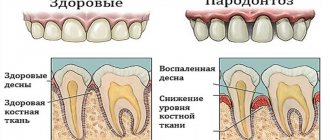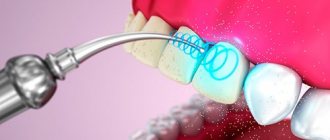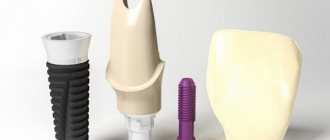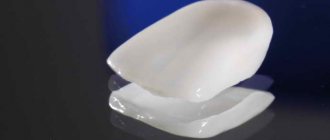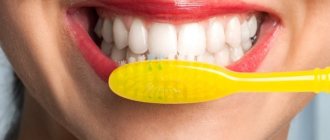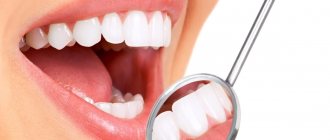Is aching pain after implant placement normal?
Implant surgery may be accompanied by temporary side effects:
- pain in the tooth and gum area;
- swelling of the gums, their bleeding;
- slight increase in body temperature;
- the presence of small hematomas.
Such symptoms are called early complications that accompany each surgical intervention. They are considered standard consequences that arise from a successful outcome of the operation and do not pose a threat to health. Correct installation of the prosthesis may be accompanied by aching pain in the gum and tooth area.
Dull aching pain for a short time in the postoperative period is normal. To alleviate it and prevent the development of acute pain, you need to follow the following recommendations:
- Apply cold compresses. A cold pack is applied to the side where the operation was performed at intervals of 20 minutes. A break is necessary to prevent hypothermia. Cold application can be carried out within one and a half days after surgery.
- Wipe soft tissues with a special solution. You need to make it yourself from: 1 tsp. salt, five drops of iodine, 200 ml of water.
- You can take a painkiller 2 hours after surgery. The permissible interval between doses of analgesics is 4 hours.
- Maintain oral hygiene to avoid infection. When brushing your teeth, do not touch the implantation site with a brush, but wipe with a cotton swab and saline solution.
- Temporarily avoid solid, hot, spicy foods.
Acute pain indicates inflammation and requires urgent medical attention.
To relieve swelling from soft tissues, the following is prescribed:
- Chlorhexidine bigluconate 0.5%. Rinse the mouth with the solution up to six times a day for several days.
- Betadine 10%. Use 6 drops of solution for external use per glass of water. Rinsing is carried out according to the scheme of the first drug.
- Solcoseryl. Dental paste is applied to the wound after rinsing. It provides wound protection, pain relief, and promotes healing. The paste can be used by expectant mothers.
- Antibiotics. Amoxiclav, Flemoklav, Augmentin have an antimicrobial effect and stop the spread of infection. Prescribe one tablet twice a day for five days.
- Non-steroidal anti-inflammatory drugs. Nimesulide, Analgin, Voltaren, Ketanov are taken if the implantation site and the areas around it hurt.
Drugs that relieve pain and reduce fever do not require systematic administration.
Folk recipes
The following medications can help minimize pain and relieve swelling:
- Kefir. Rinsing with kefir is repeated every three hours for a week.
- Sea buckthorn oil and vitamin A. The drugs are applied to the gums, they promote wound healing.
- Camomile tea. The collection is brewed, allowed to brew and rinsed in the mouth. A glass of boiling water requires 1 teaspoon of the plant. You can brew chamomile and calendula flowers in equal proportions. This mixture is boiled for 15 minutes.
- Propolis-based ointment. The drug is applied to the gums and left. It disinfects well and relieves inflammation.
- A decoction of echinacea and eucalyptus. Rinse every 5 hours. Take a tablespoon of the mixture per glass of water. The mixture is boiled for 15-20 minutes.
- Fish oil, flaxseed oil. Products containing Omega 3 fatty acids help restore gums.
- Aloe leaf pulp. A fresh leaf is crushed, wrapped in a bandage and applied to the gum.
- Plantain. Used as a compress from crushed leaves, as a decoction for rinsing. The dry plant is poured with water, boiled for 15-20 minutes, cooled and rinsed.
- Calendula. Rinse the mouth with an infused decoction of calendula 3 times a day.
During the healing period
Standard complications after dental implantation are quite common. In most cases, following medical recommendations is enough to heal the wound and normalize the condition. Aching pain after implantation should cause concern if there are accompanying symptoms:
- swelling of the gums at the implantation site and nearby;
- sore gums;
- discharge of pus;
- bleeding;
- enlargement of the gum pocket;
- mobility of the structure;
- elevated body temperature.
The patient who has implants installed must understand that the service life of the artificial root depends on compliance with medical recommendations and a responsible attitude towards one’s own health. If there are no complaints, a dental consultation is recommended once a year. If the following symptoms appear, you should immediately visit a doctor:
- resumption of pain of any intensity;
- discomfort;
- swelling of the gums;
- their redness;
- bleeding of the mucous membranes of the oral cavity;
- the appearance of itching.
The listed symptoms may indicate the development of gingivitis or stomatitis, which can provoke the appearance of peri-implantitis, and if left untreated, rejection of the structure.
During the implantation process, an artificial root is implanted into the jawbone, which takes several months to take root in the jaw. In the future, it serves as a reliable support for fixing the crown or prosthesis. The connecting link between the implant and the crown is the abutment.
The method is used in patients of all ages, starting from 21 years old with single, partial and complete edentia. Implanted rods create reliable support for crowns, removable and fixed dentures.
Rejection of the implant and exposure of the titanium rod of the structure
The causes of complications may be:
- individual physiological characteristics of the body;
- unprofessional implantation;
- poor quality of materials used;
- non-compliance by the patient with the doctor’s recommendations;
- careless attitude towards the postoperative wound.
In addition to the natural complications that arise after implant installation, there is a risk of developing “side effects.” For example, neighboring teeth may begin to hurt. This problem usually appears due to the patient’s fault if he did not follow the recommendations and did not monitor oral hygiene. Additional reasons include:
- Most often, aching pain in neighboring teeth is caused by tissue inflammation, which goes away after the implant has been implanted. If the inflammatory process is caused by the penetration of pathogenic microbes, this is eliminated by drug treatment.
- Sharp pain only bothers you when the nerve endings are damaged, which indicates the doctor’s unprofessionalism.
- Sometimes painful sensations occur due to the fact that the implant puts pressure on the root of the adjacent tooth. This means that the wrong design was selected or it was installed too close to a healthy root (the implant touches it). Even if it takes root, the discomfort and pain in the adjacent teeth will not stop. This problem can only be eliminated through surgery.
- There are situations when pain in neighboring teeth appears due to the fact that the crown is poorly polished and exceeds the appropriate size. The product will require urgent correction.
- The use of low quality or counterfeit implants can lead to implant failure. The main signs of non-engraftment: swelling, severe bleeding, discharge of pus from the wound. However, this rarely happens.
Proper and regular oral care will help you avoid complications after implantation. After all, during the day, bacterial plaque forms on the surface of implants, just like on healthy teeth. This will provoke a disruption of the microflora in the mouth, the appearance of an unpleasant odor, the development of periodontal diseases or periodontitis of neighboring teeth.
The first time after implantation, careful care will be required. It is recommended to eat only soft or pureed foods enriched with vitamins. Do not consume spicy, too hot or cold foods and drinks. After eating, do the usual rinsing of your mouth with boiled water or antiseptic solutions.
During the postoperative period, you should avoid visiting baths and saunas.
- refuse to visit the bathhouse or sauna;
- avoid stress;
- do not sleep on the operated side;
- refrain from heavy physical activity;
- reduce the consumption of drinks containing caffeine;
- stop smoking;
- exclude air travel.
While the implant has not yet taken root, when brushing your teeth, you should try to avoid the operated area. In the future, you should use pastes with anti-inflammatory properties, brushes with a narrow nozzle and soft bristles.
Cleaning with a brush
There are no special techniques for cleaning implants - all movements are similar to those used when cleaning natural teeth:
- treatment of the vestibular and lingual surfaces with circular movements with light massage of the gums;
- cleaning the chewing part by moving the brush up and down;
- removing plaque from the inner surface of the dentition using sweeping, back-and-forth movements.
Using an irrigator
To thoroughly clean the junction of the implant and the prosthesis, you will need to purchase an irrigator. It washes out even the smallest particles of food from hard-to-reach places and deep pores of the crown material using a jet of water. Provides additional massage of the gums, strengthens them, improves blood supply.
Dental floss
Dental floss is also used to remove food debris between teeth. A better effect can be achieved by first moistening it in toothpaste. Tufted brushes are also suitable for cleaning the interdental space.
Preventive measures
The recovery period after implantation surgery can reach several months. In the process of further rehabilitation, doctors recommend following mandatory preventive measures that will help you use the implant for a long time. Everyone can follow these simple rules:
- use antiseptic rinses after meals;
- use adhesive ointment to heal sutures;
- do not forget about the hygiene of the entire oral cavity, especially the teeth next to the implant, treat them with a three percent peroxide solution;
- Clean your mouth with special care;
- after 3-4 days, you can use folk remedies for rinsing, for example, a decoction of calendula or chamomile, which have an antiseptic effect.
A relatively common and natural phenomenon. As the dental system takes root and the soft tissues heal, this unpleasant sensation goes away.
But sometimes, even after healing is complete, the patient consults a doctor with a complaint that the implant is pressing on the adjacent tooth. What could this be connected with and how to deal with this problem?
Options for discomfort from the procedure
Implantation involves the introduction of a special metal rod or plate (depending on the clinical situation) into the socket of a previously extracted tooth. The procedure consists of two stages: surgical and orthopedic. Engraftment of a foreign fragment into a rod requires time, which averages 3-6 months.
Next, the orthopedic stage is performed. It also happens that only after installing a crown on an implant, the gums hurt.
At each stage, various discomfort phenomena may occur, expressed to varying degrees, which depend not only on the actions of the doctor and the patient, but also on the state of the body itself. On average, the price in Moscow for implantation ranges from 25,000 to 75,000 rubles per unit, depending on the manufacturer.
The photo schematically shows the implementation of two-stage implantation.
Stages of surgery:
- The surgical intervention is performed under anesthesia: local anesthesia is often sufficient, but with significant intervention on the hard and soft tissues of the oral cavity, the body’s resistance to pain relief may require anesthesia.
- Installation of a foreign object in the jaw bone after preliminary desalination of the gums in the socket area with a scalpel or laser. To improve fastening and stimulate osteogenesis processes, bone drilling is also carried out.
Few patients can undergo dental implantation without exhibiting any symptoms of discomfort, the main of which is pain. Even less common is a one-step installation: when implantation is carried out into the bone immediately after tooth extraction.
Such an intervention is carried out only in somatically healthy people, mainly involved in sports.
What may occur in the postoperative period:
- pain;
- numbness;
- swelling of soft gum tissue;
- bleeding in the intervention area;
- divergence of applied sutures;
- temperature.
Painful sensations appear in any case after implantation, which is often observed after the anesthetic solution has stopped working. In some cases, pain may appear during the procedure itself due to insufficient pain relief or the body's immunity to anesthetics. In this case, an increase in dosage or adjustment of the administered drugs is required.
The appearance of a pain symptom from the implant installation procedure, as a rule, can be considered normal.
Symptoms:
- nature of the pain: tearing, throbbing or paroxysmal;
- localization: locally in the area of the tooth socket or with irradiation to half the jaw or even the face;
- the appearance of itching.
How long does your gum hurt after implant placement?
Such reactions of the body can be considered normal if they exist within 4-5 days. If an unpleasant symptom persists for a longer period or if it worsens, you should consult a doctor as soon as possible in order to prevent inflammation of the gums under the implant.
Numbness
This is normal and the appearance of the symptom is associated with the influence of anesthetic solutions. On average, it lasts 5-10 hours after the end of the procedure and then goes away.
However, in some cases, numbness may persist for a longer time. If a patient notices such a sign, damage to the nerve of the jaw should be suspected. It is more common when installing implants in the lower jaw, when the mandibular nerve was affected during anesthesia. Treatment of paresis takes a long time.
Tissue swelling
It also happens that the gums become swollen after implantation. This is a normal reaction to performing a traumatic intervention. The first signs of swelling of the mucous membrane may appear several hours after the operation.
Tissue swelling is a common symptom that normally accompanies the implantation process for several days.
Swelling of the gums after implantation usually decreases and disappears by the end of the first week from the moment the metal rod is placed. If the symptom persists or worsens, you should immediately consult a doctor. Increased swelling indicates the development of inflammation.
Bleeding
In some cases, after surgery in the area of injured gum tissue, bleeding may persist for some time. The release of exudate is usually insignificant and its appearance is often associated with the effect of medications taken by the patient on the factors of the coagulation system.
If bleeding persists for more than 7 days, this may indicate injury to the blood vessels during surgery. If you do not pay attention to this symptom, there is a risk of a hematoma, which can subsequently lead to suture dehiscence and cause purulent inflammation of the gums after implantation.
Bleeding from gum tissue normally persists for some time after surgery.
Seam divergence
When placing an implant, an incision is made in the gum with a scalpel or laser. After the surgical stage is completed, sutures made of artificial material are applied. The patient must undergo periodic follow-up examinations after surgery to monitor the quality of tissue healing.
Applying sutures to the gum mucosa is a mandatory step in completing the first stage of implantation.
Seams can come apart when:
- the addition of inflammation;
- mechanical injury;
- low level of practice of a dentist, implant surgeon.
Normally, any action performed in the body surgically may result in a response in the form of an increase in temperature. Indicators slightly more than 37 over a period of 3 days can be considered normal.
A slight increase in temperature over several days is considered normal.
During this period, a primary reaction occurs in the form of inflammation of the body to the intervention. If an increase in temperature begins to be observed, this indicates the progression of inflammation and the possible addition of an infection.
Question answer
After implantation, discomfort is felt in the area of neighboring teeth, which intensifies with pressure (chewing). Why does it occur and what are the possible consequences?
A common cause of pain is the proximity of the implant to an adjacent unit. It most likely will not take root in a narrow space. If healthy teeth ache after 2 weeks, then the artificial root needs to be removed and reinstalled.
How long do gums hurt and neighboring teeth ache after implantation?
Implantation is a minimal surgical intervention in the human body. Therefore, pain that radiates to neighboring teeth and jaws may occur before the tissues have completely healed. As a rule, after 1-2 weeks the pain stops and the patient returns to his usual lifestyle. The main thing in the postoperative period is not to create excessive load (chewing solid food) on the installed structure.
What happens if you need to remove an adjacent tooth near the implant?
If a tooth has to be removed (for example, due to inflammation in the root canal), then an implant can be immediately installed in its place.
Why is it important to clean the implant connectors near the gums?
This is the easiest place for bacteria to penetrate into the gums and bone tissue. As a result, the inflammatory process is activated, which will lead to infection, affecting the area of adjacent teeth, and in the worst case, to implant rejection.
Can I use whitening toothpaste on teeth after implantation?
Yes. But if you use it regularly, coarse particles will ruin the surface of the crown. A surface covered with scratches will become a place for germs and plaque to accumulate, which will ultimately lead to darkening of the product. Therefore, non-abrasive toothpastes and soft brushes are recommended for daily use.
What can cause pain during the healing process?
No doctor can say how long it takes for gums to heal after implantation. This process is quite individual.
First of all, normal implant healing is very important for further prosthetics. Osteogenesis usually occurs for about six months.
In the upper jaw, the implantation of the metal pin may occur a little earlier. This is explained by the peculiarities of the structure, namely the density of bone tissue.
If you follow all the dentist’s recommendations, the regeneration process occurs much faster and without possible complications. Immediately after surgery, you may experience quite severe pain. To eliminate them, it is recommended to take Ketanov or Baralgin.
In addition, swelling, short-term bleeding and itching in the surgical area very often occur. Within a few days, this manifestation should disappear.
To prevent the inflammatory process, the doctor may prescribe antibacterial agents. Antibiotics are used in the form of tablets or intramuscular injections. They are also necessary in cases where the gums do not heal after implantation for quite a long time.
All discomfort should disappear within 4 weeks after surgery. At this time, the patient comes to the next appointment for removal of stitches and preventive examination of the wound. If the doctor detects any problems with the healing of soft tissues, then antiseptic rinses or oral baths with medications are prescribed.
Since the regeneration process is very individual, in some cases complete implant healing is observed after just two months. Although this period is doubtful for installing a permanent artificial crown.
Therefore, the dentist may suggest a temporary restoration immediately after surgery. It is practically no different from future permanent products and is capable of completely restoring the aesthetic appearance of the oral cavity and the basic function of the teeth.
The engraftment process is purely individual. Complications during the engraftment process are caused by:
- Decreased immunity.
- Exacerbation of chronic diseases.
- Infections.
- Injury to the maxillofacial apparatus.
- Failure to comply with the surgical protocol.
- Overheating of the bone during implantation.
- Formation of a blood clot between the implant and the gum.
- Insufficient hygiene.
In what cases should you consult a doctor?
Most postoperative symptoms bother the patient for some time and may even worsen. It is important to monitor the dynamics of the processes: if the swelling does not begin to subside on the fourth day, it is better to make an appointment with a doctor. The specialist will conduct an examination, checking for serious consequences, infection of the wound or rejection of the pin.
Other symptoms that may prompt you to visit a doctor include:
- pain persists for longer than a week;
- temperature rises;
- hyperemia of the soft tissue area appeared;
- the mucous membrane turned blue, a hematoma formed;
- Blood or pus is released at the site of the operation.
Any of the above indicators indicates that the regeneration process has not gone according to plan. If the pain does not go away within a week and swelling persists, the specialist will be able to prescribe treatment in a timely manner.
The process of tissue restoration can be influenced by the state of immunity and the presence of chronic diseases in the patient, which also needs to be taken into account when prescribing therapy.
You can see what the gums look like after successful implantation in the photo.
Is aching pain after implant placement normal?
To minimize the risk of complications, the doctor must make sure that implantation is not contraindicated and the patient’s body can bear the load. There are relative and absolute contraindications.
Bad habits significantly increase the risk of complications
Installation of implants in these cases may have a long recovery period. The pain may persist for several weeks.
Difficult implantation is also observed in the case of:
- non-compliance with installation technology;
- lack of proper oral care in the postoperative period;
- refusal of therapy during rehabilitation.
Implantation is not possible if:
- HIV infections;
- chronic diseases of bone and connective tissue;
- blood diseases;
- oncology;
- diseases of the lungs, kidneys, liver;
- endocrine diseases.
The absence of contraindications does not guarantee the absence of complications. The qualifications of the doctor play a huge role. A competent specialist will promptly eliminate any complications that arise and prevent their development.
How much does it hurt after dental implantation?
Despite the fact that the installation of dental implants of artificial tooth roots is the most modern development of the installation of dentures, it does not in any way eliminate the sensation of pain during the postoperative period and does not in any way eliminate the failure of the body to accept the tooth root. During the first days, clients may complain that:
- tooth aches after implantation;
- bleeding and swelling of the gums;
- the temperature rises.
About how to minimize the possibility of diseases occurring during the installation of dental implants, how to prevent the most common problem with implants - their “rejection”, and also about what to do when difficulties eventually arise - here are all these questions We will talk in more detail later.
Causes of complications
If we look at the problem of implantation in general, we can note several possible causes of pathological conditions.
| The fault of the dentist, implant surgeon | The patient is to blame | Features of the body's reaction to the implantation of a foreign body |
| Low qualification of doctor | Uncontrolled use of drugs | Perception of the implant as a foreign object and provoking rejection |
| Incorrectly selected design | Errors in nutrition | Weakened immunity |
| Violation of the rules of asepsis and antisepsis | Refusal to take antibiotics prescribed to prevent secondary infection | Exacerbation of chronic pathologies |
| Preoperative preparation of the bone bed is not carried out fully | Lack of appropriate care for the wound surface and oral tissues | Other teeth and mucosal tissues need sanitation |
| Low level of bone height for implantation or poor condition | Bad habits: smoking, drinking alcohol | Increased chewing load in the installation area |
| Lack of air-water cooling during operation (leads to overheating), application of significant mechanical force (can cause a fracture) | Visiting public places with high temperatures (bath, sauna) during the first month after implant placement | Features of jaw anatomy |
| Refusal to undergo periodic medical examinations |
A careful approach to implant installation on the part of both the doctor and the patient will minimize the risk of various complications.
Medical errors can provoke implant rejection within the first days or month from the moment of placement. Due to the fault of the patient himself or the manifestation of a peculiar reaction of the body, it leads to the removal of the metal rod at any time of use.
The video in this article illustrates the importance of each of the stages of implantation and the doctor’s instructions.
What you should pay attention to
It is almost impossible to exclude the possibility that the implant was placed and the gums hurt. Minor sensations may occur in a number of patients, and the pain syndrome can be relieved by adequately taking medications from the analgesic group.
After implantation, the doctor’s instructions must be followed exactly:
- exclude: spicy and fried foods, spitting and drinking with a straw;
- to refuse from bad habits;
- food of soft consistency;
- rinsing the mouth with antiseptic solutions;
- cancel trips to bathhouses and saunas for the entire adaptation period;
- Flights and ascents to altitude should also be cancelled;
- minimal physical and stressful activity;
- Using a high pillow when sleeping: prevent blood flow to the head.
The toothbrush is used with a soft degree of hardness. All movements must be as careful as possible so as not to cause accidental injury to the mucous membrane. In the absence of proper oral care, infection accumulates, which can trigger the development of inflammation.
The main point during the rehabilitation period after implantation is ensuring oral hygiene.
In general, it can be noted that implantation is an advanced method of treating adentia. Normally, with a well-drawn plan and implementation, and compliance with all doctor’s instructions, pain in the gums may not appear. And artificial teeth can perform their function throughout life.
How does normal recovery occur after implantation?
Rehabilitation after dental implantation lasts for 1-2 weeks. The first 7 days are considered the most important: during this period it will become clear whether the titanium pin is taking root and whether additional complications have arisen.
If your gums hurt after the procedure, this is a normal reaction of the body to the intervention. The anesthesia wears off several hours after surgery. How many days will the pain last? Usually the discomfort lasts from 2 to 5 days, and the specialist prescribes an anesthetic (for example, Ketorol) to alleviate the patient’s condition.
READ ALSO: technique of torsal anesthesia
Swelling after dental implantation usually occurs after a few hours - this is also an inevitable phenomenon.
To speed up healing, the channels and vessels expand, causing the tissues to increase in size. Sometimes the tumor grows so quickly and strongly that the patient notices how not only the face, but also the lips swell.
We suggest you familiarize yourself with Gum inflammation: treatment at home
The intensity of the reaction depends on the number of implants being implanted and the characteristics of the human body.
A person may also notice other symptoms: a slight increase in temperature and bloody discharge from the area of the gum where the pin was installed. This is also a normal response of the body to surgery.
